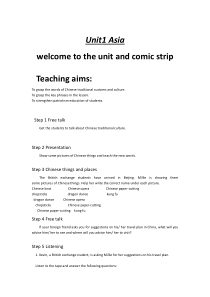 DOC
DOC
【文档说明】《Unit 1 Asia Welcome to the unit》教学设计9-九年级下册英语【牛津译林版】.docx,共(4)页,15.422 KB,由小喜鸽上传
转载请保留链接:https://www.ichengzhen.cn/view-102783.html
以下为本文档部分文字说明:
Unit1AsiawelcometotheunitandcomicstripTeachingaims:TograspthewordsofChinesetraditionalcustomsandculture.To
graspthekeyphrasesinthelesson.Tostrengthenpatriotismeducationofstudents.Step1FreetalkGetthestudentstotalkaboutChinesetraditionalculture.Step2
PresentationShowsomepicturesofChinesethingsandteachthenewwords.Step3ChinesethingsandplacesTheBritishexchangestudentshavearrivedinBeijing.Milli
eisshowingthemsomepicturesofChinesethings.Helpherwritethecorrectnameundereachpicture.ChineseknotChineseoperaChine
sepaper-cuttingchopsticksdragondancekungfudragondanceChineseoperachopsticksChinesepaper-cuttingChinesepape
r-cuttingkungfuStep4FreetalkIfyourforeignfriendasksyouforsuggestionsonhis/hertravelplaninChina,whatwillyou
advisehim/hertoseeandwherewillyouadvisehim/hertovisit?Step5Listening1.Kevin,aBritishexchangestudent,isaskingMillieforhersugges
tionsonhistravelplan.Listentothetapeandanswerthefollowingquestions:1.)WhichcitydoesMillieadviseKevintovis
itfirst?2.)WhichwonderfulplacescanKevingo?3.)WhatspecialthingscanKevinsee?2.Workinpairsandgiveyourowni
deasaboutKevin'stravelplan.Usetheconversationbelowasamodel.Kevin:I’mplanningtotravelaroundChina.WhereshallIvisitfirst,Milli
e?Millie:Sinceyou’reinBeijingnow,whydon’tyoustartfromhere?Tian’anmenSquare,thePalaceMuseumandtheGreatWallarewonderfulpla
cestogo.Kevin:Goodidea.WhatspecialthingscanIseeinBeijing?Millie:ChineseoperaisakindoftraditionalChineseart,andBeijingoperaisoneofthemostpopular.Youc
angoandenjoyit.Kevin:OK.Thankyouforyoursuggestions.Millie:You’rewelcome.Step6HoboandEddie1.Lookattheconversationbetw
eenHoboandEddie,andthenanswerthequestions.1)WhatdoesHobothinkoftheGreatWall?2)WillEddiegoontotheendoftheGreatWall?Why?2.
Actthedialogueout.Encouragethestudentstoaddtheirownideas.Step7Languagepoints1休息一下takearest2在你返回的路上onyourwayback3.Itistiringtoclimbthesteps
4.TheGreatWallisamazing,isn’tit?长城太神奇了,不是吗?反意疑问句是由陈述句和附在其后的附加疑问句组成。其中附加疑问句是对陈述句所说的事实或观点提出疑问,起证实作用,一般用于证实说话者所说的事实或观点。【注意】1)反意疑问句前后两部分谓语应是:“肯
定陈述+否定疑问”或“否定陈述+肯定疑问”。2)简略问句如果是否定式:not应与be,do,will等系动词、助动词、情态动词缩写。3)简略问句的主语不用名词,应用人称代词。4)陈述部分含“too...to”时,是否定句。5.We’db
etterkeepmoving.我们最好继续坚持。hadbetterdosth.最好做某事e.g.I’dbetterfinishmyhomeworkbeforemomgetshome.我最好在妈妈到家前完成家庭作业。keepdoingsth.坚持
做某事,一直做某事e.g.Hekepttalkinguntilthemeetingwasover.他一直在说,直到会议结束。6.Idon’twanttogoon.我不想继续了。goondoingsth.继续做同一件事e.g.Afterashortrest,theywentonworki
ng.短暂休息之后,他们继续工作。goonwithsth.继续同一件事,此时with后能接名词,代词,不能跟ing形式。e.g.Afterashortrest,theywentonwiththework.短暂休息之年,他们继续那
项工作。goontodosth.指接着做另外一件事。e.g.Afterfinishingthewords,theywentontogooverthetext.结束单词后,他们接着复习课文。Step8ExercisesⅠ.Choosethecorrectanswer.1.—Heseldomcam
ehere,_____?—Yessir.A.didn’theB.doesheC.doesn’theD.didhe2.Thereislittlejuiceintheglass,______?A.isthereB.isn’tthere
C.isit3.—You’renewhere,________?—Yes,I’mfromDujiangyan.Icameherelastweek.A.doyouB.don’tyouC.areyouD.aren’tyouKeys:D,A,DⅡ.Completeth
esentences.1.You’dbetter_________(return)thebookatonce.2.Hekept__________(cough)allmorning.Keys:run,coughingⅢ.Translateth
esentences.1.开会时他一直站着。2.你最好听你父母的话。3.我们下午去购物吧,好吗?Keys:1.Hekeptstandingduringthemeeting.2.You’dbetterlistentoy
ourparents.3.Let’sgoshoppingthisafternoon,shallwe?Step9Homework1.RecitethedialoguebetweenEddieandHobo.2.Finishtheexerc
isesonworkbook.
 辽公网安备 21102102000191号
辽公网安备 21102102000191号
 营业执照
营业执照